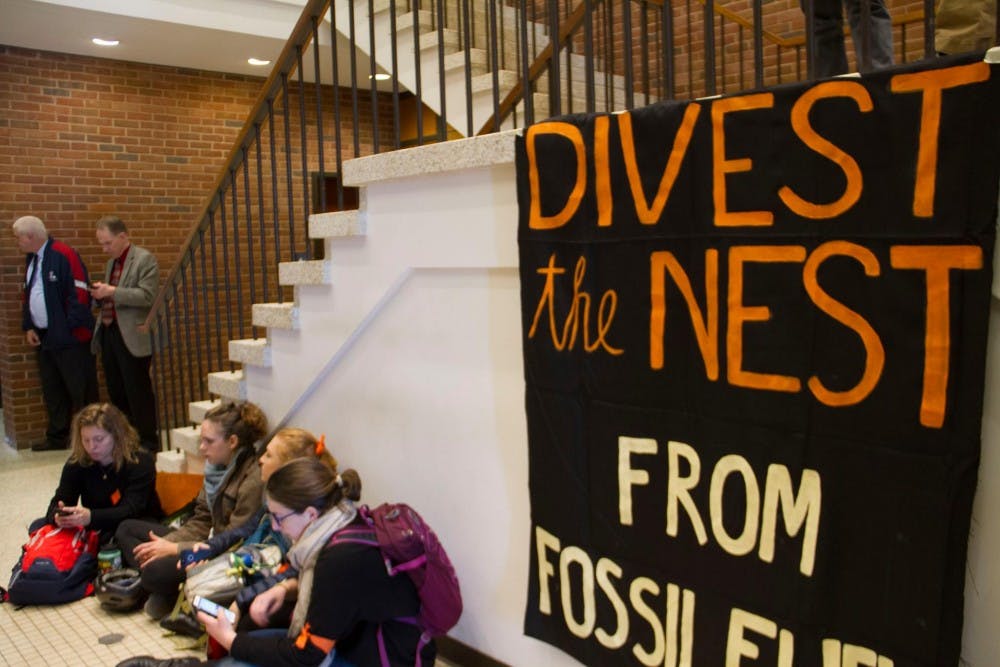The Public Interest Investment Advisory Committee (PIIAC) recommended that the University divest its endowment from fossil fuels in a report released on Friday.
The University’s Board of Trustees commissioned PIIAC to recommend where Hopkins should invest its endowment. Made up of 13 individuals from across the University’s divisions, PIIAC includes undergraduates, graduate students, faculty and staff.
In 1978, PIIAC recommended that Hopkins divest from South African corporations to protest apartheid, and in 1990 the committee called for divesting from tobacco companies.
The Hopkins student group, Refuel Our Future (Refuel), spent the past six years pressuring the University to divest from fossil fuels. They submitted their divestment proposal to PIIAC in 2015.
Senior Atlas Elawad, the president of Refuel, said that the organization was pleased with the report.
“I want to applaud PIIAC for their recommendation,” he said. “It symbolizes leadership, forward thinking and responsibility. From a financial point… as well as a social and moral point, they seem to be really thinking two steps ahead.”
In their proposal, Refuel requested that the University “terminate all direct investments” it holds in Carbon Underground 200 companies (CU 200). These companies are considered leaders in the fossil fuel industry.
They also requested that Hopkins pledge to not make any future investments in CU 200 companies.
Responding to these requests, PIIAC made a series recommendations on how to begin divesting the University’s endowment from fossil fuels.
First, the committee stated that all cash accounts in CU 200 companies should be immediately withdrawn. For the University’s direct holdings, Hopkins should divest as soon as it is contractually allowed.
The University’s endowment is also held by several equity and hedge fund portfolios. For these investments, PIIAC recommends that these portfolios are redirected to focus on more sustainable projects.
Junior Clarissa Chen, a member of Refuel, said that she was surprised by the recommendations because other schools have avoided taking firm stances on whether they want to divest.
“Schools that are in the same tier as Hopkins, in terms of academic ranking and rigor, have only chosen to divest from coal in the past,” she said. “That’s the case with Stanford. Harvard didn’t even want to divest at all.”
PIIAC reports that the University’s endowment is currently over $4 billion and that roughly 10 percent of that is held by companies in the energy sector. According to the report, divesting from fossil fuels will have a negligible financial impact on the University’s endowment.
Chen stated that divestment is not only a matter of social importance but also a fiscally responsible decision.
“We looked specifically into the financial aspects of investing in fossil fuels, and its just a bad long term investment,” she said. “[Hopkins] will lose money in the short run, but they’re going to put it where they can earn more money in the future.”
Elawad said that Refuel has not conducted research regarding where the University should relocate its investments.
“As an organization we’re declining to comment on any investment recommendations,” he said. “That’s not our speciality or expertise. We don’t understand the University's portfolio, we have limited access to what their portfolio looks like and what they’re already invested in, and optimizing their portfolio requires a lot of that knowledge.”
PIIAC pointed out that the University has a moral responsibility to divest, especially when considering the negative impacts of climate change. They also wrote that President Donald Trump’s recent exit from the 2016 Paris Climate Accords, an international agreement designed to combat climate change, influenced their recommendation.
However, PIIAC also stated that even if the University divests, it may not noticeably impact the energy market. Despite this, the Committee recognized that divestment is only effective when many institutions take part, and Hopkins must help pave the way.
PIIAC also argued that fossil fuel divestment aligned with the values of the Hopkins community and complemented other campus sustainability campaigns. PIIAC cited a Refuel survey that found that 73 percent of almost 400 respondents agreed that the University should divest.
The committee added that the Student Government Association (SGA) voted in favor of a resolution calling for divestment and referenced the JHU Forum on Divestment from Fossil Fuels, in which a series of guest speakers visited last semester to present arguments for and against divestment.
The Board of Trustees’ Committee on Investments will review PIIAC’s recommendations and vote on whether the University should divest.
Elawad said that Refuel owes its success to the support of students, staff and other members of the Hopkins community. He also said that Refuel hopes the University will follow through on PIIAC’s recommendation.
“As far as next steps, we’re not slowing down or losing steam,” he said. “We need to take this recommendation to the Board of Trustees and the Board of Trustees needs to decide what the action is. We’re pushing for full divestment in accordance with our proposal.”
Kelsey Ko contributed reporting.





